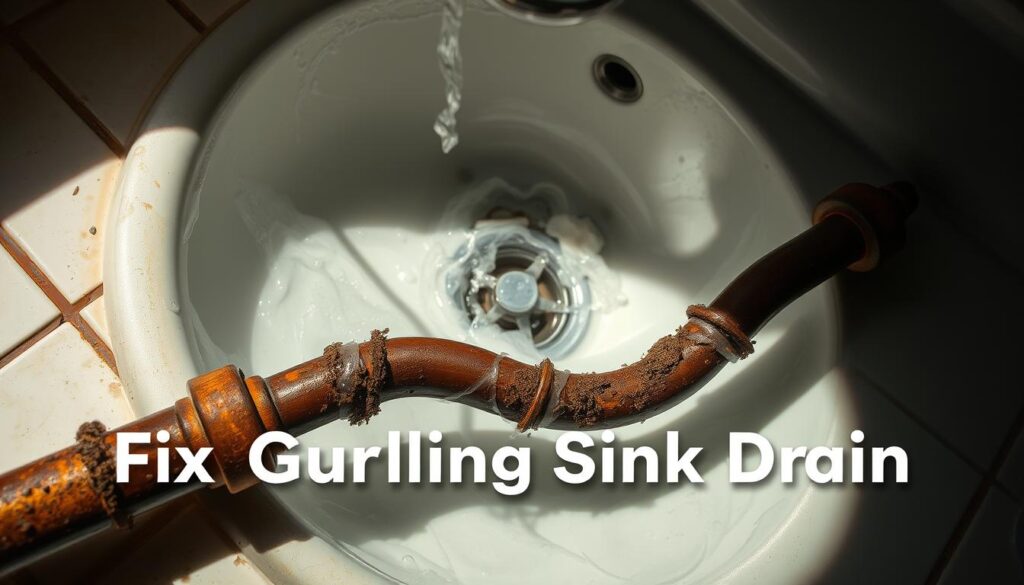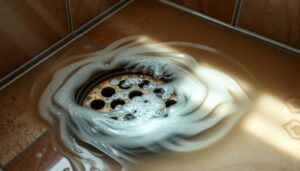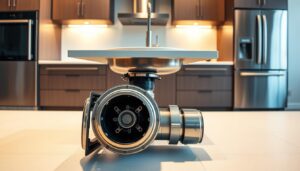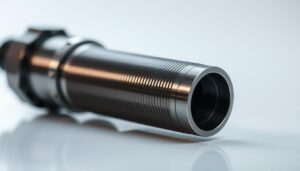Is your sink making unsettling gurgling noises after you’ve run the faucet or drained a full sink? This can be quite annoying and worrisome, signalling that something isn’t quite right with your plumbing system.
The noise often resembles bubbling or gurgling, indicating potential problems in your pipes or drainage system. Ignoring this issue can lead to more serious plumbing problems down the line, potentially resulting in costly repairs.
Key Takeaways
- Understand the common causes behind gurgling sink drains and why these strange noises occur.
- Learn why addressing these sounds promptly is crucial to prevent more serious plumbing issues.
- Discover various DIY methods to resolve the problem using simple household tools.
- Determine when to tackle the problem yourself and when to call in professional help.
- Gain the knowledge and confidence to diagnose and fix most gurgling sink drain problems.
Understanding Gurgling Sink Drains
When you hear a gurgling sound from your sink drain, it’s a sign that something is amiss in your plumbing system. The drain vent, also known as a vent stack, plays a crucial role in allowing air to enter the plumbing system, facilitating smooth water flow through the pipes.
What Causes the Gurgling Sound?
Gurgling sounds in your sink drain typically occur when air is trapped or forced through water in your plumbing system, creating bubbles that make the characteristic gurgling noise. The primary causes include:
- Blocked drain vents
- Clogged pipes
- Improper pipe installation
- Issues with your home’s main sewer line connection
Why You Shouldn’t Ignore It
Ignoring gurgling sounds can lead to more serious plumbing issues, such as complete blockages, water damage, or even sewage backups into your home. When your sink gurgles, it’s essentially warning you that the normal flow of water and air through your plumbing system has been disrupted.
Understanding that gurgling is a symptom rather than the problem itself is crucial for effective troubleshooting and repair. The sound may be intermittent or occur only when using specific fixtures, which can provide important clues about the location and nature of the underlying issue.
Common Causes of Gurgling Sink Drains
The gurgling noise coming from your sink is a clear indication that something is amiss in your drainage system. This issue can stem from various problems within your plumbing.
Clogged Drain Pipes
A clogged drain is one of the most common reasons for a gurgling sink. Over time, debris like food particles, grease, and hair can accumulate in the pipes, creating a blockage. When water tries to flow past this blockage, it causes air bubbles to form, leading to the gurgling sound.
Blocked Drain Vents
Blocked drain vents prevent proper air circulation in your plumbing system, creating pressure imbalances that result in gurgling sounds when water drains.
Faulty P-Trap
The P-trap, a pipe under your sink, holds water to prevent sewer gases from entering your home. If it’s broken or not installed correctly, it can cause air to escape, leading to gurgling sounds.
Damaged Sewer Lines
Damaged sewer lines can allow air and gases to enter your plumbing system, causing gurgling sounds in multiple drains. Cracks or collapses in the sewer line can lead to these issues.
- Clogged drain pipes trap air and water, forcing bubbles back up through the drain.
- Blocked vents create pressure imbalances, resulting in gurgling sounds.
- A faulty P-trap can lead to both gurgling noises and unpleasant odours.
- Damaged sewer lines cause gurgling sounds in multiple drains.
Tools You’ll Need to Fix a Gurgling Sink Drain
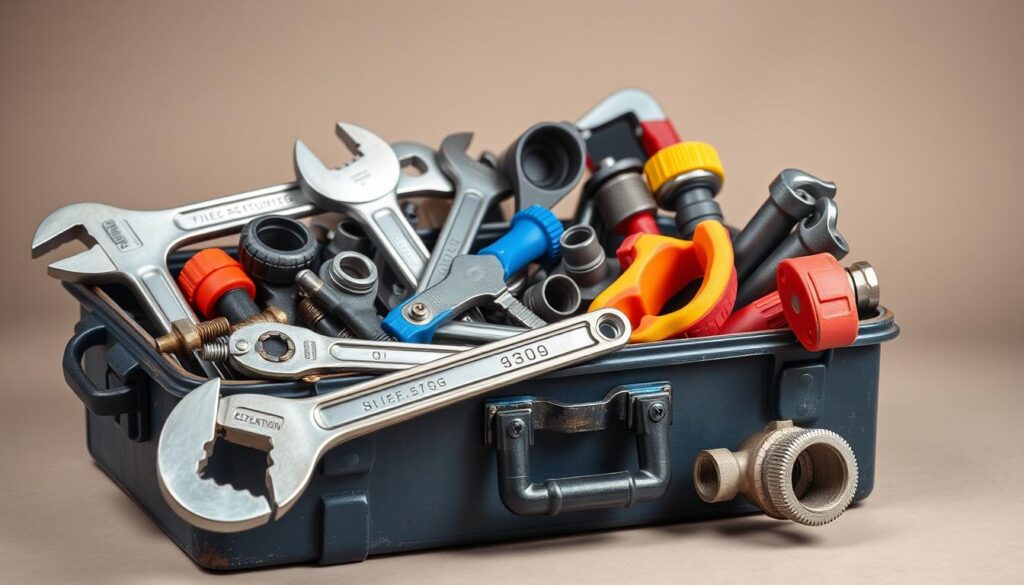
The right tools are essential for fixing a gurgling sink drain effectively. You’ll need a combination of basic household tools and specialised plumbing tools to tackle the job.
Basic Household Tools
Basic household tools for fixing a gurgling sink drain include a cup plunger specifically designed for sinks, rubber gloves to protect your hands, and a bucket to catch water when disassembling pipes. You’ll also need adjustable wrenches for loosening pipe fittings, a flashlight for inspecting dark drain areas, and old towels or rags for cleanup.
Specialised Plumbing Tools
Specialised plumbing tools that may be necessary include a drain snake (auger) for reaching deeper clogs, a pipe wrench for stubborn connections, and potentially a drain camera for inspecting hard-to-see blockages. For vent-related issues, you might need a ladder to access roof vents, along with a garden hose for flushing out blockages.
Safety Precautions Before You Start
Safety should be your top priority as you prepare to tackle the issue with your sink drain. Fixing a gurgling sink can involve dealing with potentially hazardous materials and situations.
Protective Gear
To protect yourself, always wear appropriate protective gear. This includes rubber gloves to safeguard against bacteria and harsh chemicals that may be present in drain pipes.
Preparing Your Work Area
Ensure your work area is safe and prepared. This involves turning off the water supply to the sink, clearing the area under the sink, and placing a bucket and towels to catch any spills.
| Safety Measure | Purpose |
|---|---|
| Rubber Gloves | Protect against bacteria and chemicals |
| Safety Goggles | Shield eyes from splashes |
| Proper Ventilation | Prevent inhalation of sewer gases |
Clearing Blocked Drain Vents
Gurgling noises from your sink can often be traced back to blocked drain vents. The drain vent, or vent stack, plays a crucial role in your plumbing system by allowing air to enter and facilitating smooth water flow through the pipes.
Locating Your Vent Pipes
To address the issue, you first need to locate your vent pipes. These pipes typically protrude from your roof, are about 2-4 inches in diameter, and are often found near bathrooms and kitchens. Checking your roof for these pipes is the initial step in diagnosing a potential blockage.
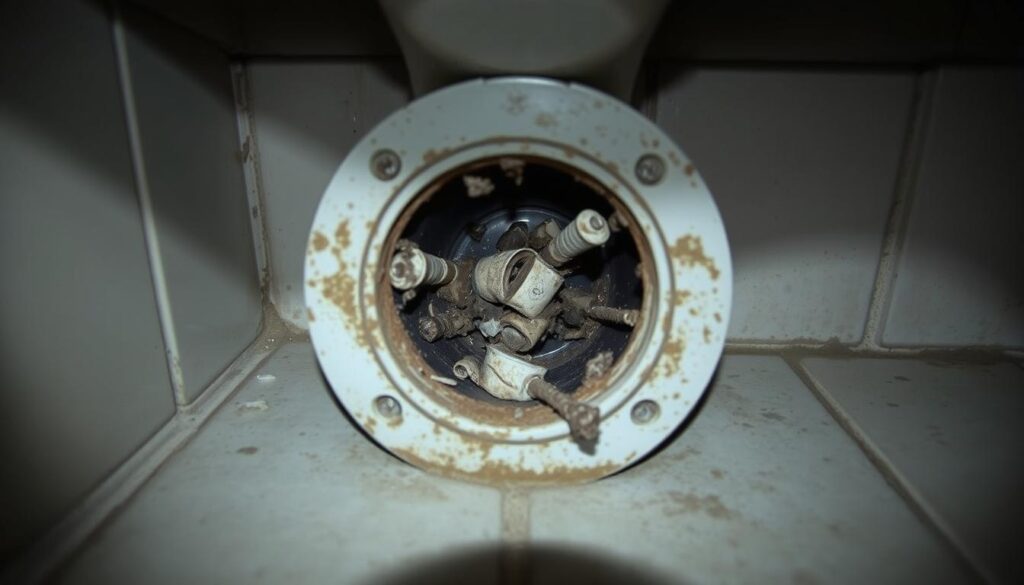
Safe Methods to Clear Blockages
Before attempting to clear the blockage, ensure you can safely access your roof. Use a sturdy ladder and proper safety equipment. If you’re uncomfortable with heights, it’s advisable to call a professional to avoid any risk.
- For accessible vents, use a garden hose to flush water down the vent pipe, which can dislodge many types of blockages.
- More stubborn blockages may require a plumber’s snake to break up the obstruction.
- Never use chemical drain cleaners in vent pipes as they can damage your plumbing system.
If you’re unable to clear the blockage yourself, professional plumbers have the necessary equipment to diagnose and clear vent pipe obstructions effectively. Regular maintenance can also help prevent future issues with your sink’s gurgling sounds.
Dealing with Deeper Clogs
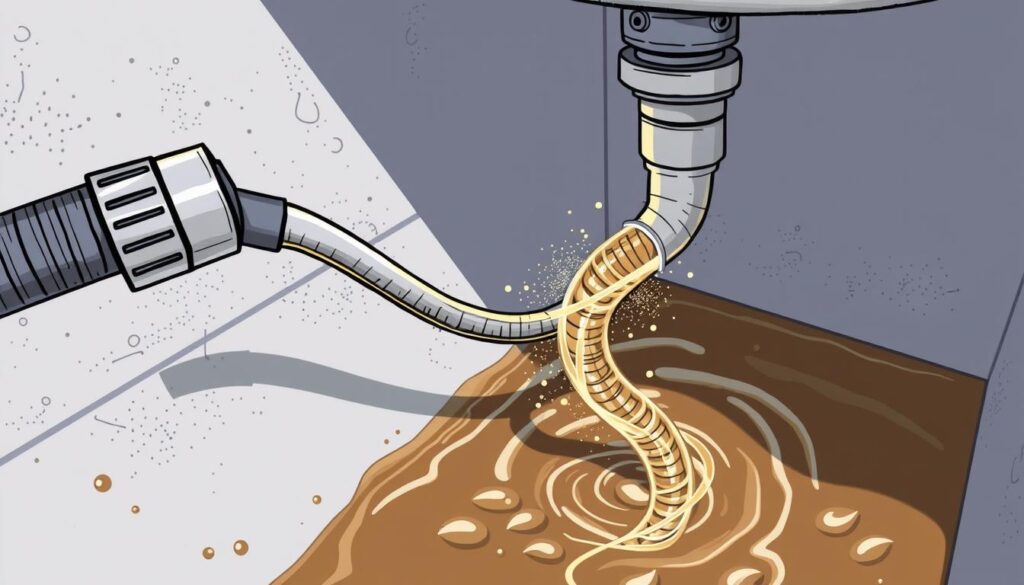
To fix a gurgling sink drain that persists after basic clearing methods, you need to address potential deeper clogs. When you’ve tried using a plunger and cleaning the P-trap without success, it’s likely that the issue lies further down your plumbing system.
Using a Drain Snake
A drain snake, or plumber’s snake, is a flexible tool that can reach deeper clogs. It’s particularly useful for removing stubborn blockages that are beyond the reach of a plunger.
Step-by-Step Instructions
To use a drain snake effectively, insert it into the drain opening and slowly turn the handle clockwise while pushing it forward until you feel resistance from the clog. Once you encounter the blockage, continue rotating the snake while applying gentle pressure to break up the clog, then slowly withdraw the snake, bringing debris with it.
Tips for Maximum Effectiveness
For stubborn clogs, you may need to repeat the process several times, gradually working through the blockage until water flows freely. Be cautious not to damage your pipes with excessive force.
Natural Cleaning Solutions
For those preferring a more environmentally friendly approach, natural cleaning solutions can be effective. The baking soda and vinegar method is particularly useful for minor to moderate clogs.
Baking Soda and Vinegar Method
Pour one cup of baking soda down the drain followed by one cup of white vinegar. Cover the drain for 5-10 minutes as the mixture fizzes, then flush with boiling water. This method can help clear blockages without harsh chemicals.
Hot Water Flush Technique
For grease-based clogs, carefully pour a kettle of boiling water directly down the drain. This can melt and dislodge fatty deposits causing the gurgling sounds.
If these methods don’t resolve the gurgling, the blockage may be in your main sewer line, requiring professional equipment and expertise to address safely. In such cases, it’s advisable to call a professional plumber.
When to Call a Professional Plumber
When DIY methods fail to resolve the gurgling sink issue, calling a professional plumber is the next step. While many gurgling sink issues can be resolved with DIY methods, certain signs indicate it’s time to seek professional help rather than continuing with home remedies.
Signs of Serious Plumbing Issues
If you notice multiple drains gurgling simultaneously throughout your home, it suggests a main sewer line problem that requires professional equipment and expertise to diagnose and repair. Other signs include gurgling accompanied by sewage odours, water backing up into other fixtures, or slow drainage throughout your home, which are serious indicators of potential sewer line issues.
- Recurring gurgling that returns shortly after DIY fixes indicates a deeper problem that needs professional attention to prevent more serious damage.
- For homes with septic systems, persistent gurgling may indicate septic tank issues requiring professional pumping or repair services.
What to Expect from Professional Service
Professional plumbers have specialised equipment like drain cameras that can pinpoint the exact location and nature of blockages causing gurgling sounds. When calling a professional plumber, expect them to conduct a thorough inspection of your entire plumbing system, not just the gurgling sink, to identify any connected issues.
They can also provide preventative maintenance advice and services to help avoid future gurgling problems and extend the life of your plumbing system. The cost of professional service is often justified by preventing more expensive emergency repairs that might result from untreated plumbing issues.
Preventing Future Sink Gurgling
Preventing sink gurgling requires a combination of regular maintenance and mindful drain usage. By adopting a few simple habits, you can significantly reduce the likelihood of encountering this issue in the future.
Regular Maintenance Tips
Regular maintenance is crucial for a healthy plumbing system. This includes establishing a monthly drain cleaning routine using natural solutions like baking soda and vinegar followed by hot water. Installing drain screens or strainers in all sinks can also help catch hair, food particles, and other debris before they enter your plumbing system.
- Schedule professional septic tank inspections and pumping every 3-5 years.
- Conduct seasonal plumbing checks, particularly before winter and after autumn.
- Consider having a professional plumber perform an annual inspection of your entire plumbing system.
What Not to Put Down Your Drain
Being mindful of what goes down your drains is equally important. Avoid disposing of cooking oils, grease, coffee grounds, eggshells, and starchy foods that commonly cause blockages. Educating all household members about proper drain use and disposal practices can help maintain a healthy plumbing system throughout your home.
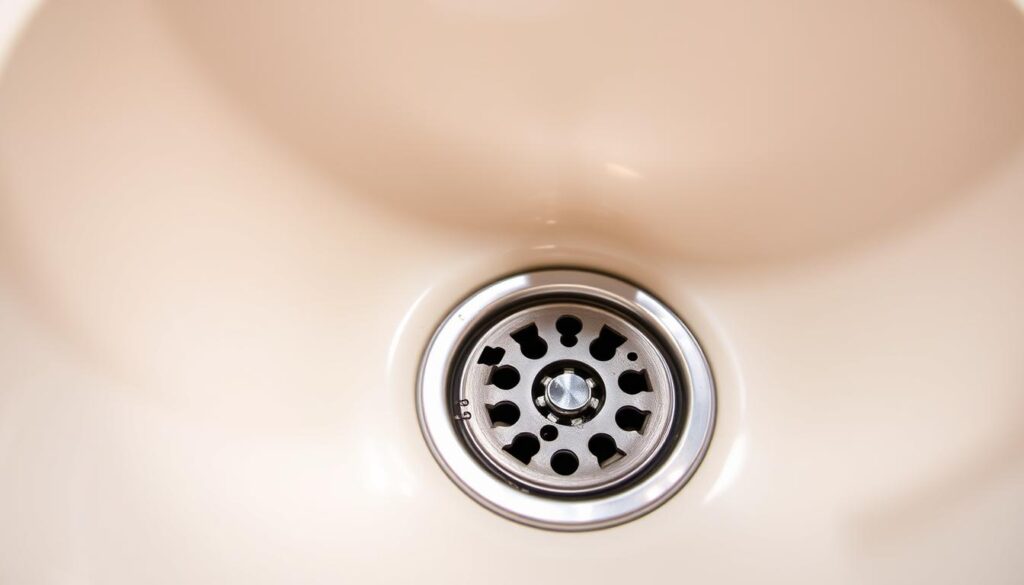
Seasonal Plumbing Checks
Seasonal checks can help identify potential issues before they become major problems. For instance, before winter, check vent pipes for freezing temperatures, and after autumn, clear any blockages caused by fallen leaves.
| Maintenance Task | Frequency | Benefit |
|---|---|---|
| Drain Cleaning | Monthly | Prevents buildup and gurgling |
| Septic Tank Inspection | Every 3-5 years | Prevents system backups |
| Plumbing System Inspection | Annually | Catches potential issues early |
For more detailed solutions on fixing gurgling sinks, you can refer to effective solutions for a quiet drain.
Conclusion
A gurgling sink is more than just an annoyance; it’s a sign that your plumbing system needs attention. Throughout this guide, we’ve explored the various causes of gurgling sink drains, from simple clogs to more complex issues with your sewer line or plumbing system. By checking for debris, using a plunger or drain snake, inspecting your P-trap, and maintaining your septic tank, you can often resolve the problem yourself. For persistent issues, don’t hesitate to call a professional plumber. Regular maintenance is key to preventing future problems, including being mindful of what goes down your drain and performing seasonal checks of your plumbing system. By being proactive, you can save time, money, and the stress of dealing with severe plumbing issues.
